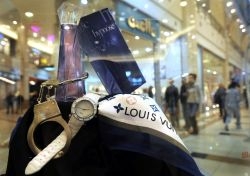LVMH, Google unite against fake online luxury goods

The agreement ends nearly 10 years of litigation over complaints by LVMH — owner of top luxury labels in everything from champagne to luggage — that the Google Adwords key words service helped counterfeiters sell their products on the back of LVMH brands.
LVMH is a leading group in the growing, global market for luxury products, but faces the mounting problem of copycat products sold at huge discounts.
The companies said in a joint statement that they would work together „to develop new ways of engaging consumers online whilst preserving the value of trusted brands and enhancing creativity…“
They said they would use their considerable resources „to tackle the advertising and sale of counterfeit goods online“.
For Google, the head of the business in southern and eastern Europe, Carlo D’Asaro Biondo, said: „We are very happy to reach this agreement with LVMH and to work together to tackle the advertising of counterfeit goods online and preserve the value of trusted brands.“
LVMH vice president Pierre Gode said the deal meant that „brands will be protected both online and offline“.
Google was found guilty in a French court in 2005 of counterfeit activities, unfair competition and providing misleading advertising.
The Internet giant lost an appeal the following year and a superior court then referred the matter to the EU European Court.
In 2010, the European Court of Justice gave a judgement in favour of Google, holding that the search engine did not itself undermine protected brands and trademarks when it allowed them to be used as keywords to trigger the presentation on screen of advertisements.
However, Google could be held responsible once it realised that an advertiser was involved in illicit activities, and if it did not act immediately to withdraw or block the advertiser’s content, the court ruled.
The case was then sent to the Court of Appeal in Paris, but has now been settled by the agreement announced on Thursday.
alv/hd/sms/

